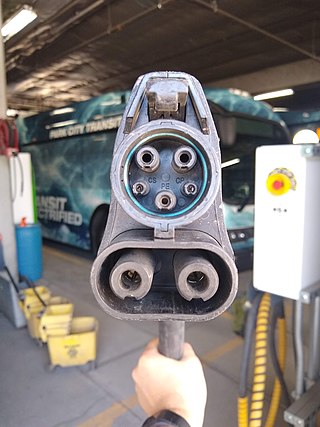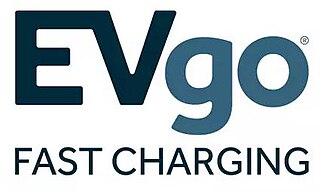Innogy SE was an energy company based in Essen, Germany. It is now merged and integrated into German energy company E.ON.

A charging station, also known as a charge point or electric vehicle supply equipment (EVSE), is a power supply device that supplies electrical power for recharging plug-in electric vehicles.

An electric car or electric vehicle (EV) is an automobile that is propelled by one or more electric traction motors, using only energy stored in batteries. Compared to conventional internal combustion engine (ICE) vehicles, electric cars are quieter, more responsive, have superior energy conversion efficiency and no exhaust emissions and lower overall vehicle emissions. The term "electric car" normally refers to battery electric vehicle (BEV), but broadly may also include plug-in hybrid electric vehicle (PHEV), range-extended electric vehicle (REEV) and fuel cell electric vehicle (FCEV).

An electric vehicle charging network is an infrastructure system of charging stations to recharge electric vehicles. Many government, car manufacturers, and charging infrastructure providers sought to create networks. Today, charging network vendors include either proprietary solutions, or hardware agnostic solutions. Hardware-agnostic vendors allow for customers to switch out their charge stations and/or switch to a different network vendors ; whereas proprietary vendors do not allow customers to switch.
ChargePoint is an American electric vehicle infrastructure company based in Campbell, California. ChargePoint operates the largest online network of independently owned EV charging stations operating in 14 countries and makes some of the technology used in it.
ECOtality, Inc., headquartered in San Francisco, California, was an electric transportation and storage technologies company. ECOtality was the parent company of ECOtality North America, Innergy Power Corporation, Fuel Cell Store and ECOtality Australia Pty Ltd.

Electric car use by country varies worldwide, as the adoption of plug-in electric vehicles is affected by consumer demand, market prices, availability of charging infrastructure, and government policies, such as purchase incentives and long term regulatory signals.

CHAdeMO is a fast-charging system for battery electric vehicles, developed in 2010 by the CHAdeMO Association, formed by the Tokyo Electric Power Company and five major Japanese automakers. The name is an abbreviation of "CHArge de MOve" and is derived from the Japanese phrase "o CHA deMO ikaga desuka" (お茶でもいかがですか), translating to English as "How about a cup of tea?", referring to the time it would take to charge a car.

In China, the term new energy vehicle (NEV) is used to designate automobiles that are fully or predominantly powered by electric energy, which include plug-in electric vehicles — battery electric vehicles (BEVs) and plug-in hybrid electric vehicles (PHEVs) — and fuel cell electric vehicles (FCEV). The Chinese Government began implementation of its NEV program in 2009 to foster the development and introduction of new energy vehicles, and electric car buyers are eligible for public subsidies.

The adoption of plug-in electric vehicles in Germany is actively supported by the German Federal Government. Under its National Platform for Electric Mobility, Chancellor Angela Merkel set an initial goal in 2010 to deploy one million electric vehicles on German roads by 2020, which was achieved with a six months delay in July 2021. Initially, the government did not provide subsidies to promote sales of plug-in electric vehicles, however, by the end of 2014 it was recognized that the country was well behind the set sales targets. A purchase bonus scheme was approved in 2016, but premium cars were not eligible to the incentive. In order to meet the climate targets for the transport sector, in 2016 the government set the goal to have from 7 to 10 million plug-in electric cars on the road by 2030, and 1 million charging points deployed by 2030.

The Combined Charging System (CCS) is a standard for charging electric vehicles. It can use Combo 1 (CCS1) or Combo 2 (CCS2) connectors to provide power at up to 350 kilowatts (kW) . These two connectors are extensions of the IEC 62196 Type 1 and Type 2 connectors, with two additional direct current (DC) contacts to allow high-power DC fast charging. In response to demand for faster charging, 400 kW CCS chargers have been deployed by charging networks and 700 kW CCS chargers have been demonstrated.

EVgo is an electric vehicle DC fast charging station network in the United States, with more than 850 charging locations as of August 2022. The company's charge stations are located in 34 states and are compatible with all major auto manufacturers.

SemaConnect was an electric vehicle infrastructure company located in Bowie, Maryland founded in 2008 by entrepreneur, Mahi Reddy. The company and its assets were acquired by Blink Charging in June 2022. On June 23, 2023, Blink Charging officially migrated all remaining SemaConnect infrastructures onto their own network, therefore phasing out the use of the SemaConnect brand entirely.

ISO 15118Road vehicles -- Vehicle to grid communication interface is a proposed international standard defining a vehicle to grid (V2G) communication interface for bi-directional charging/discharging of electric vehicles. The standard provides multiple use cases like secure communication, smart charging and the Plug & Charge feature used by some electric vehicle networks.

The adoption of plug-in electric vehicles in Australia is driven mostly by state-based electric vehicle targets and monetary incentives to support the adoption and deployment of low- or zero-emission vehicles. The monetary incentives include electric vehicle subsidies, interest-free loans, registration exemptions, stamp duty exemptions, the luxury car tax exemption and discounted parking for both private and commercial purchases. The Clean Energy Finance Corporation, energy providers, car loan providers and car insurance providers also offer their own financial incentives for electric vehicle purchases including Macquarie Bank offering the lowest electric car loan of 2.99%.

BlueSG is a Singaporean company providing electric car sharing and electric car charging services. Announced in September 2017, the company, a subsidiary of Goldbell, launched the service in December of the same year, with 30 charging stations and 80 all-electric Bolloré Bluecar for public use on a paid subscription basis.

Electrify America is an electric vehicle DC fast charging station network in the United States, with more than 788 charging locations and over 3,531 individual charging units as of September 2022. It is a subsidiary of Volkswagen Group of America, established in late 2016 by the automaker as part of its efforts to offset emissions in the wake of the Volkswagen emissions scandal. In June 2022, Electrify America received its first external investor with a $450 million investment from Siemens for a minority shareholder stake, valuing Electrify America at $2.45 billion.

The adoption of plug-in electric vehicles in New Zealand is supported by incentives and policies devised by the New Zealand Government. The monetary incentives include electric vehicle discounts, exemptions from road user charges, and electric vehicle sales targets. As of June 2023, there were 84,914 plug-in electric vehicles in New Zealand, consisting of 61,219 battery-electric vehicles and 23,695 plug-in hybrid vehicles. Plug-in electric vehicles make up 1.77% of New Zealand's 4,798,770 vehicle fleet.

The adoption of plug-in electric vehicles in Iceland is the second highest in the world after Norway, and fully supported by the government. As of 2022, the market share of electric vehicles in Iceland is around 60%, the second-highest in the world behind Norway. Around 14% of the country's passenger car fleet is electrified as of 2022.

The North American Charging Standard (NACS), currently being standardized as SAE J3400 and also known as the Tesla charging standard, is an electric vehicle charging connector system developed by Tesla, Inc. It has been used on all North American market Tesla vehicles since 2012 and was opened for use to other manufacturers in 2022. Ford, General Motors, Mercedes-Benz, Nissan, Polestar, Rivian, and Volvo have announced that starting from 2025, their electric vehicles will be equipped with the NACS charge port.















